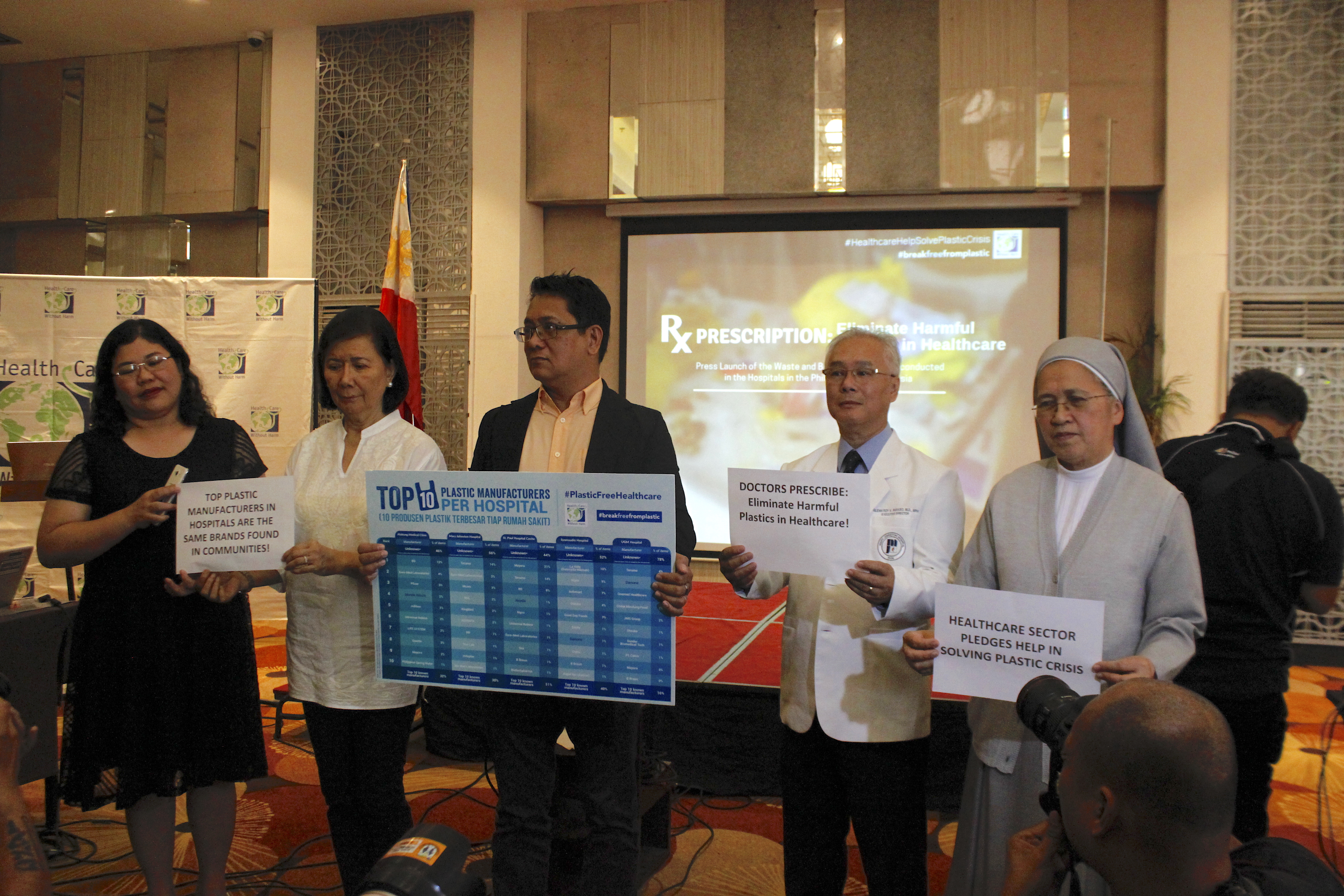PRESS RELEASE | Philippine Launch of the Plastics in Healthcare Report

DOCTORS GATHER TO PRESENT TOP PLASTIC MANUFACTURERS IN HEALTHCARE AND CALL FOR ELIMINATION OF HARMFUL, SINGLE-USE PLASTICS IN HOSPITALS
Philippine Launch of the Waste and Brand Audit Report conducted in Hospitals in the Philippines and Indonesia
On November 22, 2018 doctors, nurses and hospital representatives from leading hospitals in the Philippines, came together to reveal top plastic sources in a healthcare setting and call for the reduction and elimination of harmful plastics in healthcare and pave the way towards a sustainable management of plastics in a hospital waste stream to protect public and planetary health.
Like any other waste that is dumped indiscriminately, hospital waste will find its way into the sea; therefore, in an aim to assess ways by which the health care sector can use its purchasing power and its voice to address health impact of plastics from its production to its use, treatment and disposal, Health Care Without Harm (HCWH) Asia conducted a series of Hospital Waste and Brand Audit in select hospitals in the Philippines and Indonesia.
The Waste and Brand Audit organized in these hospitals showed that the percentage of plastics in a hospital waste stream is between 49% to a staggering 72%. To magnify it more, unlabeled plastic items per hospital reached up to 78% demonstrating a big fail in the part of manufacturers to properly identify the type of plastic being produced for healthcare operations – and without proper labeling, proper usage and even disposal can be inaccurate, leading to open dumping or waste incineration.
The brands present in several of the hospitals that also coincide with the result of the #breakfreefromplastic’s brand audit were Nestle, Danone and Monde Nissin. While one hospital in Indonesia had La Vida (a known bottled water brand) as their top plastic source and Mayora (manufacturer of sachet products like Kopiko and Torabika) as the top source for one of the Philippine hospitals.
Continued increases in plastic production and consumption, combined with wasteful uses, inefficient waste collection infrastructures and insufficient waste management facilities, especially in developing countries, mean that even achieving already established objectives for reductions in marine litter remains a huge challenge, and one unlikely to be met without a fundamental rethink of the ways in which we consume plastics1.
Other hospital waste audit highlights are the following;
- Plastics make up one third to half the non-food healthcare waste
- A significant proportion of the medical plastic waste is the same unnecessary and non-recyclable disposables that are generated by the general public and are causing the global plastics crisis
- Most plastic items found are not labeled, making it harder for medical professionals to make informed decisions about whether the products they are using are the best ones for them, the patients and the planet
- Hospitals mostly recycle their IV and PET bottles as well as paper materials in order to generate extra income and at the same time prevent indiscriminate dumping of healthcare waste
- The Report highlights the ways in which healthcare can start to escape the plastics trap that is doing so much damage to our planet
Advancement of global healthcare takes not just modern technologies and top-of-the-line medications, but also requires the realization of a truly sustainable and safe healthcare management system that understands the link between the sector’s landmark operations and the possible impacts it can create on the environment, wildlife and people’s health.
This Audit Report made possible by the hospitals from Indonesia and the Philippines will historically release the Result of the Waste and Brand Audit that will demonstrate the bulk of plastics in the hospital waste stream and importantly, to put emphasis on the role of the healthcare sector in positioning itself as a critical stakeholder for reduction and elimination of the plastic crisis, to protect public and planetary health.###
Official Audit Report may be accessed here: http://bit.ly/PlasticsInHealthcareReport
----------------------------------------------------------------
REFERENCES:
1https://enveurope.springeropen.com/articles/10.1186/s12302-018-0139-z
Support this campaign, visit our Social Media Pages located in the upper right or search #EliminateHarmfulPlasticsInHealthcare #breakfreefromplastic
